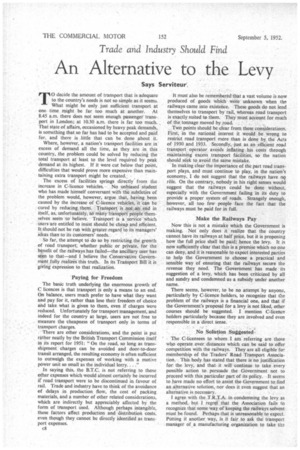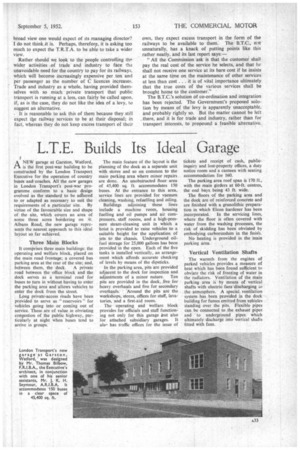Trade and industry Should Find
Page 44

Page 47

If you've noticed an error in this article please click here to report it so we can fix it.
An Alternative to the Levy
Says Serviteur', TO decide the amount of transport that is adequate to the country's needs is not so simple as it seems. What might be only just sufficient transport at one time might be far too much at another. At 8.45 a.m. there does not seem enough passenger transport in London; at 10.30 a.m. there is far too much. That state of affairs, occasioned by heavy peak demands, is something that so far has had to be accepted and paid for, and there is little that can be done about it.
Where, however, a nation's transport facilities are in excess of demand all the time, as they are in this country, the problem could be solved by reducing the total transport at least to the level required by peak demand at its highest. If it were cut below that point, difficulties that would prove more expensive than maintaining extra transport might be created., .
The excess of facilities springs directly from the
increase in C-licence vehicles. No unbiased student who has made himself conversant with the subtleties of the problem would, however, argue that, having been caused by the increase of C-licence vehicles, it can be cured by reducing them. Transport is .rot an end in itself, as, unfortunately, sO many transport people themselves seem tobelieve. Trankportis a :service which users are entitled to insist Should be cheap and efficient. It Should'not be run withgreater regard 'to its managers'
ideas than to its customers' needs.: .
So far, the attempt to do So by restricting the growth of rOad transport; whether public or private, for the benefit of the railways has failed—the ancillary user has seen to that—and I believe the Conservative Government fully realizes this truth. In its Transport Bill it is giving expression to that realization.
'Paying for Freedom
The basic truth underlying the enormous growth of C licences is that transport is only a means to an end. On balance, users much prefer to have what they want and pay for it, rather than lose their freedom of choice and take what is given to them, even if charges Were reduced. Unfortunately for transport management, and indeed for the country at large, users are not free to measure the cheapness of transport only in terms of transport charges.
• There are other considerations, and the point is put rather neatly by the British Transport Commission itself in its report for 1951: "On the road, so long as transshipment charges can be avoided and door-to-door transit arranged, the resulting economy is often sufficient to outweigh the expenses of working with a motive power unit so small as the individual lorry...."
In saying this, the B.T.C. is not referring to those other expenses which would almost certainly be incurred if road transport were to be discontinued in favour of rail. Trade and industry have to think of the avoidance of delays in production flow, the cost of packing materials, and a number of other related considerations, which are indirectly but appreciably affected by the form of transport used. Although perhaps intangible, these factors affect production and distribution costs, even though they cannot be directly identified as transport expenses.
c8 It must also be remembered'that a vast volume is now produced of goods which were unknown when the railways came into existence. These goods do not lend themselves to transport by rail, whereas road transport is exactly suited to them. They must amount for much of the tonnage moved by road.
Two points should be clear from these considerations. First, in the national interest it would be wrong to restrict road transport more than is done by the Acts of 1930 and 1933. Secondly, just as an efficient road transport operator avoids inflating his costs through maintaining excess transport facilities, so the nation should se-A to avoid the same mistake.
In making clear the importance of the part road transport plays, and must continue to play, in the nation's economy, I do not suggest that the railways have no role. On the contrary, nobody in his right senses would suggest that the railways could be done without, especially with the Government failing in its duty to provide a proper system of roads. Strangely enough, however, all too few people face the fact that the railways must be paid for in full.
Make the Railways Pay Now this is not a mistake which the Government is making. Not only does it realize that the country cannot have its railways at half price, but it is proposing how the full price shall be paid; hence the levy. It is now sufficiently clear that this is a premise which no one can deny, and it is reasonable to expect interested parties to help the Government to choose a practical and sensible way of ensuring that the railways secure the revenue they need. The Government has made its suggestion of a levy, which has been criticized by all and sundry and condemned as a subsidy under another name.
There seems, however, to be no attempt by anyone, particularly by C-licenee holders, to recognize that the problem of the railways is a financial one, and that if the Government's proposal for a levy is not liked, other courses should be suggested. I mention C-licence holders particularly because they are involved and even responsible in a 'direct sense. . _
No Solution Suggested
• The C-licensees to whom I am 'referring are those who operate over distances which can be said to offer competition with the railways. They are all eligible for membership of the Traders' Road Transport Association. . This body has stated that there is no justification for, the levy, and that it will Continue to take every possible action to persuade the GOvernment not to proceed with this particular part of its policy. It seems to have made no effort to assist the Government to:find an ,alternative solution, nor does it even suggest that an alternative is necessary.
I agree with the T.R.T.A: in. condemning the levy as a method, but I regret that the Association fails to recognize that some way of keeping the railways solvent must be. found. Perhaps that is unreasonable to expect. Patting it another way, is it fair to ask the transport manager of a manufacturing organization to take the
broad view one would expect of its managing director? I do not think it is. Perhaps, therefor, it is asking too much to expect the T.R.T.A. to be able to take a wider
view. • Rather should we look to the people controlling the wider activities of trade and industry to face the unavoidable need for the country to pay for its railways, which will become increasingly expensive per ton and per passenger as the number of C licences increases. Trade and industry as a whole, having provided themselves with so much private transport that public transport is running at a loss, can fairly be called upon, if, as is the case, they do not like the idea of a levy, to suggest an alternative.
• It is reasonable to ask this of them because they still expect the railway services to be at their disposal; in fact, whereas they do not keep excess transport of their own, they expect excess transport in the form of the railways to be available to them. The R.T.C., &It unnaturally, has a knack of putting points like this rather neatly, and its last report says:— " All the Commission ask is that the customer shall pay the real cost of the service he selects, and that he shall not receive one service at its bare cost if he insists at the same time on the maintenance of other services at less than cost . . . it is of vital importance ultimately that the true costs of the various services shall be brought home to the customer."
The B.T.C.'s solution of co-ordination and integration has been rejected. The Government's proposed solution by means of the levy is apparently unacceptable, and probably rightly so. But the matter cannot be left there, and it is for trade and industry, rather than for transport interests, to propound a feasible alternative.
















































































